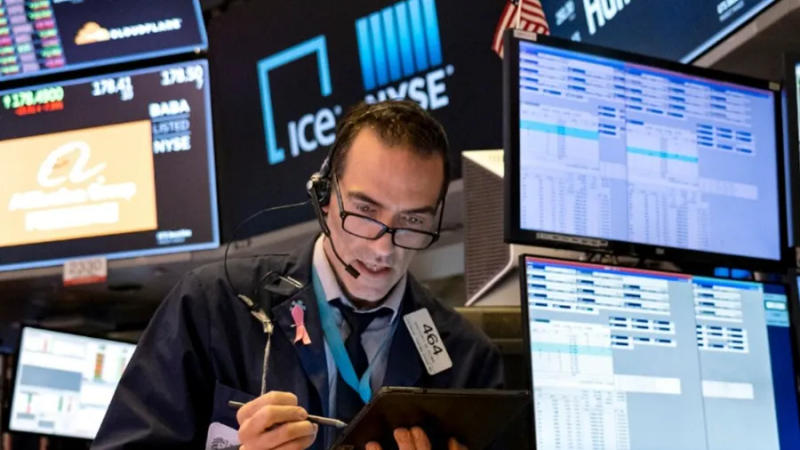Published 15:00 IST, October 4th 2024
Stocks rise in jittery trade, focus on Middle East and jobs data
Oil prices have risen 8.6 per cent this week, set for their biggest weekly gain since early October 2022's 11.3 per cent weekly gain.

Global stocks rose on Friday while oil prices were headed for their biggest weekly gain in two years, as escalating tensions in the Middle East kept markets on edge.
With the all-important monthly US nonfarm payrolls report just hours away, investors were reluctant to drive any asset prices too hard in one direction or another.
The payrolls report could prove instrumental in setting the path of monetary policy in the coming months. Traders have already reeled in their bigger bets on another outsized rate cut in November from the Federal Reserve.
Adding a note of optimism was a rally in Hong Kong stocks on the back of China's massive stimulus measures. S&P 500 and Nasdaq futures tacked on 0.1 per cent, suggesting shares on Wall Street may edge higher later.
Oil prices have risen 8.6 per cent this week, set for their biggest weekly gain since early October 2022's 11.3 per cent weekly gain, as flaring tensions in the Middle East raise the risk of serious disruptions to global crude supply.
US President Joe Biden said on Thursday that the US was discussing strikes on Iran's oil facilities, when asked whether he would support Israel's strikes in retaliation for Tehran's missile attack on Israel.
Biden's comments sparked a surge in oil prices, which had already been on the rise this week.
Brent crude futures rose 0.7 per cent to $78.17 a barrel, while US futures gained 0.7 per cent to trade at $74.24.
Equities traded with caution, as did currencies. The MSCI All-World index was up 0.1 per cent, while Europe's STOXX 600 rose 0.2 per cent.
"I do wonder whether there maybe a bit of caution heading into the weekend. Is anyone really going to want to hold big positions going in?" City Index market strategist Fiona Cincotta said.
"As far as the data is concerned, it's ticking over nicely - not too hot, not too cold. But there is that lingering and looming concern over what might happen in the Middle East and that might (limit) any strong reaction to an encouraging payrolls number."
Japan's Nikkei, which rose 0.2 per cent on Friday, was set for a weekly loss of about 3 per cent.
Japanese stocks have had a choppy few sessions this week as investors weighed rising geopolitical tensions against the domestic rate outlook.
Prime Minister Shigeru Ishiba said this week that economic conditions in the country were not ripe for more rate hikes by the Bank of Japan (BOJ), reversing the hawkish tone he struck prior to his election victory.
The comments, coupled with more dovishness from other officials, sent the yen weakening past the 147 per dollar level, although it did trade 0.45 per cent higher on Friday and last stood at 146.29 per dollar.
Still, the Japanese currency was headed for a weekly fall of 2.8 per cent.
Meanwhile, US East Coast and Gulf Coast ports began reopening on Thursday night after dockworkers and port operators reached a wage deal to settle the industry's biggest work stoppage in nearly half a century.
This hit the shares of shipping companies in Asia and Europe, which slid on the prospect of freight charges - which had jumped when the strike started - resuming their downward trend.
Economic Resilience
The dollar hovered near a six-week high ahead of the payrolls report that could decide the path of interest rates.
Expectations are for the US economy to have added 140,000 jobs last month, slightly down from August's 142,000 increase.
Against a basket of currencies, the dollar was last at 101.87.
A slew of data releases this week pointed to a US economy still in solid shape, meaning investors will place extra focus on Friday's payrolls data.
"The US services ISM beat strongly on the upside, exceeding all forecasts. It certainly points to a robust US economy," Alvin Tan, head of Asia FX strategy at RBC Capital Markets, said. "Our base case assumption remains that the US labour market is normalising rather than faltering."
The euro was little changed at $1.1028, though it was set for a weekly drop of 1.2 per cent. Sterling rose 0.2 per cent to $1.3159 after Bank of England chief economist Huw Pill said high interest rates were not a key reason for weakness in British business investment.
The pound staged a 1 per cent fall on Thursday after Governor Andrew Baileywas quoted as saying the BoE could become "a bit more activist" on rate cuts if there is further good news on inflation.
Elsewhere, spot gold rose 0.34 per cent to $2,665.15 an ounce.
Updated 15:00 IST, October 4th 2024




